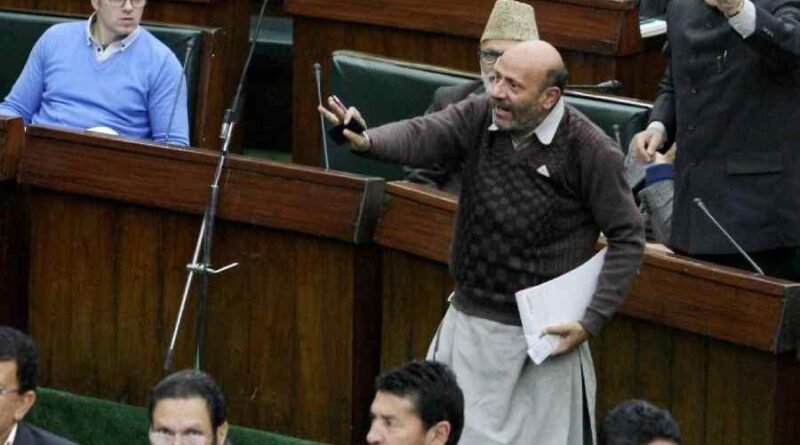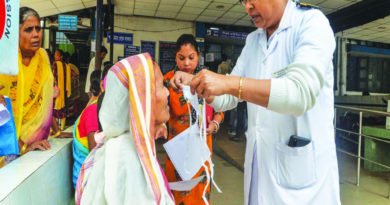An idea aflame
As Jammu and Kashmir drifts towards a promised assembly election, it cannot be that many more, especially in the Valley, wouldn’t be tempted to embrace the Rashid example
A spectre is haunting Jammu and Kashmir. That is not unusual for our most distressed geography. But it is not the spectre of violent death renewing its lease and traipsing across new ground with bloodied feet. It is the spectre of Abdul Rashid Sheikh, better known as Engineer Rashid, independent member of the Lok Sabha from Baramulla. It does not matter that Rashid is in Tihar jail charged under the Unlawful Activities (Prevention) Act, or that the prospect he’ll be out anytime soon is unreal. Engineer Rashid has become a flaming idea, the idea of insurrection through the instruments of the State. That idea cannot be imprisoned or contained.
It’s not about the plain fact of Rashid grabbing the Baramulla Lok Sabha seat; it’s about the fashion of it. Who does he beat en route to Parliament? The former chief minister, Omar Abdullah, of the National Conference and the aspiring chief minister, Sajad Lone, of the People’s Conference. How much by? He exceeded Omar by over two lakh votes and Sajad, his former political boss, by over three. There’s a cold shiver running up and down Kashmir’s established nativist parties — the National Conference and the Peoples Democratic Party — on what Rashid’s victory and its sweeping manner could mean, although they would likely be loath to admit it just yet.
Rashid represents a sentiment and a constituency over which there can be little confusion — it is deeply, and fundamentally, anti-State. The swollen voter numbers, not just in Baramulla but across the Valley, indicated not an endorsement of the diminishment imposed in August 2019 as some claim but bubbling anger against the measure and what has followed. Rashid, or ideological outliers of his kind, may well be seen by the electorate as those who best represent public grouse and indignation. The core slogan of Rashid’s runaway campaign — “Jail ka badla vote se lenge!” — probably comes closest to capturing the predominant mood on the ground.
I first met Engineer Rashid in 2008. He had just rebelled against the People’s Conference — still flying the secessionist flag at the time — and decided to contest the assembly elections as an independent from Langate, his native neck in Baramulla. He was then, as he remains in many ways, an oddball character convinced of an especially destined role. He had no party or followers. He had no resources of his own. He lived in a ramshackle shack whose floor was strewn hay and which shared a mud wall with a cowshed. He made it a statement of not wearing shoes and he reeked of bovine things. Quite literally an unwashed entity convinced he was on course to becoming a phenomenon. He exuded the sense of a man who had nothing to lose, particularly from his unvarnished and often too forthright and provocative manner of speaking. Example: “We have become accustomed to being reduced to whatever the state wants to reduce us to, we have lost the shame of having ourselves reduced, that is who we are.”
He fancied himself as a raconteur, loved telling tales, several of which he published in Urdu newspapers; there was a time they published stuff that, for a start, would now earn you a call from the local thana.
“… There were several winters we did not go to sleep, not a man who they thought able. We’d be ordered out at three in the morning, sometimes earlier, and be lined up on the snow piled up along the roadside. We were not allowed shoes and only minimal clothing. They did not want anyone concealing weapons. It used to be freezing, the snow would be packed and hard. It was cold but it felt like burning coals on the heels. We were meant, each one of us, to hold lanterns aloft in our faces so we could be identified and then we were meant to jump up and down on the snow like monkeys to assure our masters we weren’t carrying any arms, up and down, up and down in the snow till we could feel our feet no more. That was the start of the morning. They used to call it convoy duty. We would walk single-file on each side of the road for miles, human shields against landmines or cruder explosive devices. Whatever it was, we dragged the snows to secure the road for passing military convoys. Nobody stopped unless commanded, not even to rub your feet back from numbness or to answer nature’s call. If you did, you’d be hit by a rifle butt. And you were not meant to fall. If you did, you got kicked in the belly by boots. We did this each morning, hundreds of us from villages and hamlets, monkeys securing the road for the security forces…”
There is no disclaimer to such and other stories. They happened early in the decade of the 1990s. Armed militancy was running amok, the army and the paramilitary were tasked with its suppression. Rashid, as MLA from Langate, put his signature to some of them and made them a matter of public record. “I have nothing against the Indian army or security forces,” Rashid once told me in a conversation, “I only want an admission and an unqualified apology.”
Back in 2008, everyone he met on his barefoot walking campaign, he asked for one rupee, no more. “I am not contesting this election,” he would tell me, “the people of Langate are.” Nobody gave him a chance. He won Langate and went on to put a deeper emboss on the pocket than the Lones of People’s Conference whose fiefdom it used to be. Now, having felled Omar and Sajad, Rashid has grabbed all of Baramulla, the only North Kashmir seat in Parliament.
As Jammu and Kashmir drifts towards a promised assembly election, it cannot be that many more, especially in the Valley, wouldn’t be tempted to embrace the Rashid example. Contest on a grievance ticket and make it a flash-mob poll. Reports are already spewing about the Valley that lead actors of the proscribed Jamaat-e-Islami Jammu and Kashmir are mulling the prospect of entering the UT assembly, directly, if the ban were to be revoked, or through proxy candidates. Rashid’s in a Delhi jail, his spectre looms large over Kashmir, and could become a sight to behold.
Author: Sankarshan Thakur
Source: The Telegraph online




